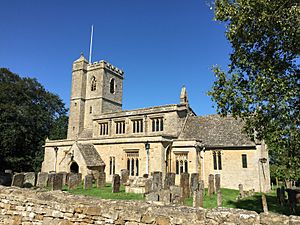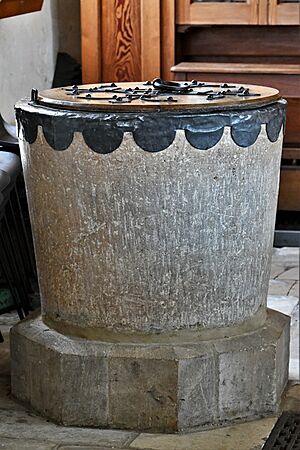Church of St Leonard, Bledington facts for kids
Quick facts for kids Church of St Leonard |
|
|---|---|
 |
|
| Lua error in Module:Location_map at line 420: attempt to index field 'wikibase' (a nil value). | |
| Denomination | Church of England |
| Architecture | |
| Heritage designation | Grade I listed building |
| Designated | 25 August 1960 |
| Administration | |
| Parish | Bledington |
| Diocese | Gloucester |
| Province | Canterbury |
The Church of St Leonard is a beautiful old church located in Bledington, a village in the Cotswold District of Gloucestershire, England. This church belongs to the Church of England. It was first built way back in the 12th century. Today, it is recognized as a Grade I listed building, which means it's a very important historical building.
Contents
History of the Church
The Church of St Leonard was originally built in the 1100s. It was then greatly rebuilt and made more beautiful in the 1400s. Even with these changes, it still has some of its older parts. A special feature is the painted glass from the 15th century that you can still see in some windows.
Early Beginnings
The first time a church in Bledington was mentioned was in 1175. This was in a document from Pope Alexander III. He confirmed that Winchcombe Abbey owned all its churches, including this one. The east and west walls of the main part of the church, called the nave, are thought to be from this very early time.
Big Changes in the 15th Century
Most of the church was rebuilt in the late 1400s. During this time, the roof of the nave was made higher. New windows were added, and a clerestory was built. A clerestory is an upper part of a wall that has windows to let in light. Most of these new windows were square-shaped. They had a special design called Perpendicular tracery, which is like stone patterns. Five of these windows also had special shelves for statues.
A new area with a three-light window was built near the south side of the church. The south doorway, also from the 15th century, still has part of its original door.
Changes Over Time
In 1548, Somerset, who was helping the young King Edward VI, ordered that all statues and images be removed from churches. By 1650, St Leonard's had lost its rood screen (a screen that separated parts of the church) and window statues.
Hidden parts of older wall decorations are now visible. You can see a pattern of rosettes and heart shapes from the 14th century on the west wall of the chancel. There is also a black outline of a crowned female saint with long hair on the east wall of the nave.
Restoration Work
By the mid-1800s, the church was in poor condition. It was repaired in 1881 by J. E. K. Cutts. It was repaired again around 1923 by F.E. Howard. The church pews were replaced in 1904. However, some decorative 15th-century bench ends were kept.
The church serves both Bledington and the nearby hamlet of Foscot. It is part of the Evenlode Vale group of churches within the Diocese of Gloucester.
Church Architecture and Features
The Church of St Leonard is built from stone. Its roofs are made of lead and special Cotswold stone. The church has several parts:
- A chancel (the area around the altar) with a small bell-cot for a sanctus bell.
- A clerestoried nave (the main part of the church where people sit).
- A south aisle (a side section).
- A south porch (the entrance).
- An embattled west tower (a tower with a top that looks like castle walls).
Building Stages
The chancel, the nave arcade (a row of arches), and the south porch were built in the 13th century. Some new windows were added in the 14th century. Later, a three-story tower was built. The west wall of the nave forms the base of this tower.
Church Bells
The tower has five bells from the 17th century. There is also a sixth bell from 1811. One bell, made in 1639, has a special message: We are the bells of Bledington and Charles is our King.
Stained Glass Windows
The eight windows on the north wall of the nave and a recessed window in the south wall of the chancel were filled with painted glass from the same time period. This glass still survives today. Some are fragments put back together, while others are almost complete panels. It is thought that a famous glazier named John Prudde of Westminster might have made this glass. He also made similar windows for the Beauchamp chapel in Warwick. You can still see some of the messages and names of people who donated money, with one dated 1470.
Inside the Church
The font, which is used for baptisms, is shaped like a tub and dates back to the 12th century. The communion rails and the altar table are from the 17th century. Next to the pulpit, which was added in the 20th century, there is an old wrought-iron stand that once held an hourglass.
Churchyard Memorial
In the churchyard, there is a war memorial that remembers soldiers from the village.
 | Stephanie Wilson |
 | Charles Bolden |
 | Ronald McNair |
 | Frederick D. Gregory |


